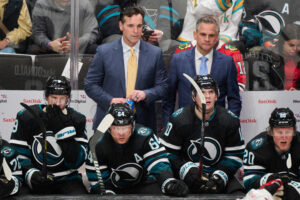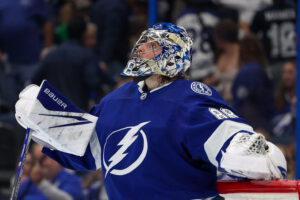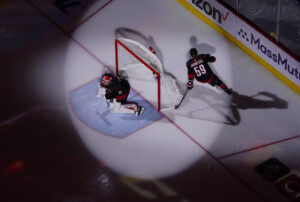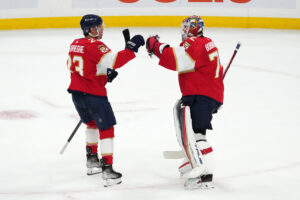We’re on the final part of our four-part series regarding the broken systems around NHL Playoff Officiating and player safety. In our prior pieces, we’ve covered head hits, a very high profile play which resulted in major injuries to Joe Pavelski and a hand pass which led to a goal that ended a playoff game. What we’ve also covered are the missing elements that surround these stories and observed layers of failure. Most importantly, we’ve found an absence of accountability from within the NHL and from the media which covers the league.
Part 4: NHL Playoff Officiating, Player Safety and a Failure of Accountability
When it comes time to solving problems, it is important to actually understand the problem. All too often, we get caught up in the ‘shiny object’ moment, as opposed to doing the real work which requires taking a full view of what occurred. What is remarkable, no one in a major role took up the charge on any of the three subjects here. Not in the league office, not in the media.
The common theme is to blame the on-ice officials. It is worth noting, officials can’t defend themselves since they don’t speak to the media.
The cynic in me says on-ice officials are the best possible scapegoat because all the other explanations make the league look worse. Blaming the officials is lazy and everyone seemed to accept the lazy explanation because it blamed the people easiest to blame.
Those Deserving of Criticism
If people at the NHL or in the media wonder if they are the target of my criticism, I’ll put it this way. If you’re being paid good money to analyze NHL hockey, looked at these issues, failed to do the work to figure out what really happened and just went with the all too convenient narrative, then yes, you a target of my criticism. From the commissioner to player safety to the major NHL media to a fake ‘victim’, the criticism is deserved. You’ve been lazy or incompetent or cowardly. Maybe all three. Please, take it personally because you need to do your job better.
The Three Real Stories
Story 1: The outcry for replay as a result of the hand-pass makes me laugh because it wasn’t the problem. There was a real story behind the call. This is what can occur when officials swallow their whistles for an entire game and call essentially nothing. But no one in a position with meaningful responsibility bothered to notice. Importantly, the major NHL media missed the real story.
Even the narrowly-scoped new rule adopted by the league to address hand passes (and similar situations) is problematic for the most obvious of reasons, calls can still be wrong. In our particular case, the non-call on the hand pass would change, but the non-call on the trip which led directly to the hand pass would stand. In short, the NHL’s ‘fix’ still would result in an incorrect call.
Story 2: The Pavelski injury was scoped narrowly and carelessly. The company line was honoured, even though it made no sense. The full story is this: a targeted player (including elbow to the head, sucker-punch to the head, stick to the groin, all in the moments preceding the injury) was seriously injured when a player on the opposing team crossed the line between hurting another player and injuring him. There was no reason to give a ‘benefit of the doubt’ and replays confirm the player going out of his way to increase the injury risk on the play.
A major penalty was deserved, even if the specifics of the call were wrong. The league then failed to do a meaningful review on a play which resulted in serious injury. A review which might lead to changes in player safety; this is shameful in its own right. But league went still further, issuing an apology which undermines the idea of player safety on a fundamental level. As a result, the league, the team and the major NHL media all played roles which amount to a massive farce.
Story 3: Head hits are something the league should take seriously but the evidence says it doesn’t. Whether it is officials making the calls, the on-site personnel checking for concussions, teams owning up to their responsibility or the league’s Department of Player Safety addressing the issue after the fact, all these systems failed. Player safety is compromised. The major media made it worse, as it, once again, failed. It either ignored or buried the story.
For all the problems with the league, the major NHL media merits a special calling out. They did a disservice to their audience – readers, viewers and listeners – in all of these cases. A media which works to get the complete story has a far better chance of forcing the changes which matter, ultimately improving the game itself. The major NHL media puts its spotlight on where it chooses and it has chosen poorly. Repeatedly.
The Sharks Fan Viewpoint
Since I cover the San Jose Sharks, it is where I get the most feedback. There are two points worth mentioning here regarding Sharks fans which feed into an unhealthy, but at least partially justified narrative.
Sharks fans have been livid on the officiating, especially the accusation it somehow favoured their team. As Sharks fans see it, calls favouring the team were replayed over and over. The ones which went against the Sharks never saw the light of day beyond when they happened. The league furthered the frustration by failing to address the actual issues in an honest manner. The laziness of the media makes them complicit. On this front, Sharks fans have a good case.
There’s also a belief among some in Sharks Territory that the team suffered a backlash from the favourable calls. This seemed to peak in the Blues series following the hand pass game and many wonder if this resulted in non-calls on plays like the head hit on Tomas Hertl in Game 5. While there is a storyline here (and there are certain things which one can point to), actual evidence of a backlash is tricky to come by. The St. Louis Blues dominated Games 4-6 and the Sharks did not lose because of an officiating backlash, they lost because they only scored twice in three games.
The NHL Ecosystem and Where To Go From Here
Much of this four-part series is about how assumptions colour our views and create excuses for not viewing things as they are. At best, it is lazy. At worst, it is dangerous.
The league has made rule changes inspired by some of the events described in the series. I can describe these changes in a single word: fraud. They address phony issues while ignoring the real ones, especially ones around player safety.
In any business, to fix problems requires an accurate assessment of the problems. The keyword is accountability. In theory, it is there. In practice, it isn’t. On this front, there is way too much broken within the NHL ecosystem. Mistakes won’t get fixed if they are covered up. Should people be fired? I can’t imagine anything gets better with the people in charge now.
To get the full story often requires some digging. In these cases, not even all that much digging. From NHL leadership to player safety to individual franchises to officials and especially to the media, stop being an embarrassment to the game. Your efforts have been disgraceful. Either do a much, much better job by being genuinely accountable or leave. Anything less is a disservice to all the league’s stakeholders and the game itself.






